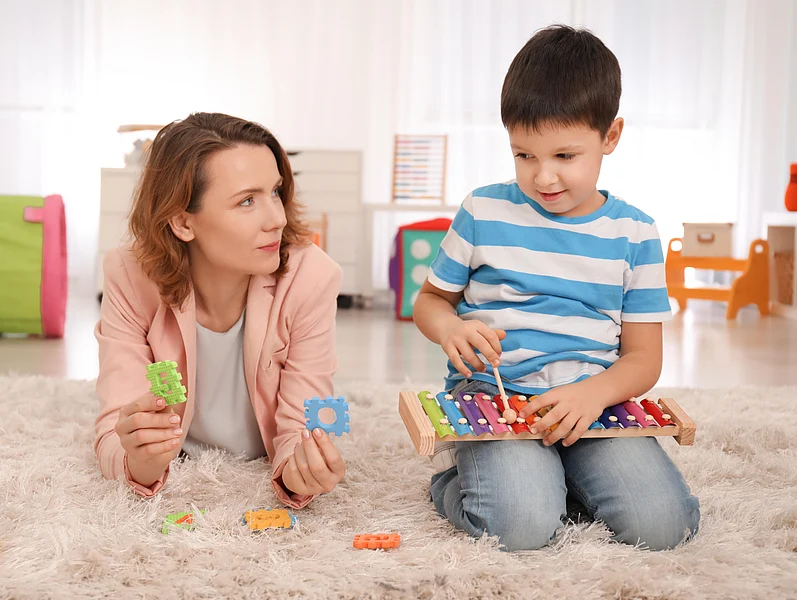Call in for additional information.
No Appointment Necessary.
Manténgase sano!

- Amy Norton
- Posted May 3, 2023
Mindfulness Approach Helps Ease the Stress of Parenting a Child With Autism
"Mindfulness" practices may help parents of young children with autism manage their daily stressors, and it could benefit their kids in the process, a preliminary study suggests.
Parenting is stressful, and studies show that parents of kids with autism often have particularly high stress levels.
Autism is a developmental brain disorder that, to varying degrees, impairs communication and social skills. Some kids have milder difficulties, but others are profoundly affected -- speaking little, if at all, and getting wrapped up in repetitive, obsessive behaviors. Some children have intellectual disabilities, while others have average or above-average IQs.
There are various therapies and services to help improve daily functioning and quality of life for kids with autism.
But they typically do not address parents' stress and coping skills, said Rachel Fenning, the lead researcher on the new study.
Traditionally, she noted, there's been something of an assumption that services that benefit children with autism will also help ease parents' stress.
But that is not necessarily true, since parents can be dealing with all kinds of challenges, said Fenning, who directs the Claremont Autism Center at Claremont McKenna College, in Claremont, Calif.
The stressors can range from problems accessing autism services or learning how to implement a child's therapy strategies at home, to the bigger-picture issues of balancing work and home life, paying the bills and more.
So Fenning and her colleagues wanted to see whether teaching parents an approach to coping could help.
They turned to mindfulness-based stress reduction (MBSR) -- a standardized, eight-week program first developed in the 1970s by Jon Kabat-Zinn, at the University of Massachusetts Medical School. It combines meditation and gentle yoga postures, with the goal of helping people shift their responses to stress.
The basic idea is for people to become aware of their habitual reactions to daily stressors -- whether they ruminate or "catastrophize," for example -- and learn to give their attention to the present moment instead.
Fenning's team recruited 117 parents of preschoolers with autism, most of whom were from under-served minority families. Half were randomly assigned to learn MBSR, while the other half received a standard educational and support service that did not directly address parents' stress. Parents attended in-person sessions until the pandemic intervened, and the study shifted to an online format.
Overall, parents in both groups reported less stress for up to a year afterward, but the effects were greater in the MBSR group.
Meanwhile, parents in both groups also reported improvements in their children's emotional regulation. There was no significant difference between the two groups, Fenning said -- so it's not clear whether parents' MBSR practice, per se, made a difference.
But across the groups, Fenning noted, there was a correlation between improvements in parents' stress ratings and improvements in their child's emotional regulation.
Fenning plans to present the findings Wednesday at the annual meeting of the International Society for Autism Research, in Stockholm. Studies presented at meetings are generally considered preliminary until they are published in a peer-reviewed journal.
Neill Broderick is a pediatric psychologist at Vanderbilt University Medical Center, in Nashville. She and her colleagues have also been studying MBSR for parents of children with autism.
"Mindfulness can be very powerful in its capacity to help us move through stressful situations," Broderick said.
In a 2020 study, she and her colleagues focused on parents of children younger than 3 who'd been newly diagnosed with autism -- a time that can be full of challenges. All of the parents received a standard service that taught them techniques for engaging their child in communication and play. Half also received MBSR education.
On average, parents who learned mindfulness reported bigger reductions in stress and gave better ratings to their interactions with their child, versus the comparison group.
Broderick said her team tried to make mindfulness practices as accessible as possible: Parents could do it by giving their full attention to any task at hand -- like washing the dishes or making dinner.
"It's not something you have to add to your to-do list," Broderick said.
The bottom line is that parents of children with autism should acknowledge when they are stressed and need time for themselves, according to Alycia Halladay, chief science officer for the nonprofit Autism Science Foundation.
"Mindfulness is great, and if it works for you, do it," she said.
But, Halladay added, not everyone will be drawn to that kind of practice.
"Figure out what works for you and do it, without feeling guilty," Halladay said. When parents feel better, she noted, it generally spills over to their kids.
Broderick made the same point. "Wellness begets wellness," she said.
For parents who want to learn MBSR, there are universities and other institutions that offer courses, in person and online. Broderick said she and her colleagues are creating a manual they intend to make free and widely available.
More information
Yale School of Medicine has more on MBSR.
SOURCES: Rachel Fenning, PhD, associate professor, psychological science, director, Claremont Autism Center, Claremont McKenna College, Claremont, Calif.; Neill Broderick, PhD, assistant professor, developmental medicine, Vanderbilt University Medical Center, Nashville, Tenn.; Alycia Halladay, PhD, chief science officer, Autism Science Foundation, Scarsdale, N.Y.; May 3, 2023, presentation, International Society for Autism Research annual meeting, Stockholm
